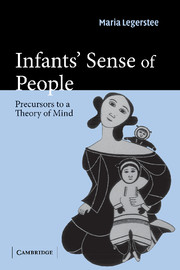Book contents
- Frontmatter
- Contents
- Preface
- 1 Definitions, theories, and plan of the book
- 2 Endogenous and exogenous influences in development
- 3 Animate/inanimate distinction
- 4 Self and consciousness
- 5 Dyadic interactions
- 6 Triadic interactions – Joint engagement in 5 and 7-month-olds
- 7 Social influences on infants' developing sense of people
- 8 Affect attunement and pre-linguistic communication
- 9 The quality of social interaction affects infants' primitive desire reasoning
- 10 Social cognition – affect attunement, imitation, and contingency
- References
- Index
10 - Social cognition – affect attunement, imitation, and contingency
Published online by Cambridge University Press: 22 September 2009
- Frontmatter
- Contents
- Preface
- 1 Definitions, theories, and plan of the book
- 2 Endogenous and exogenous influences in development
- 3 Animate/inanimate distinction
- 4 Self and consciousness
- 5 Dyadic interactions
- 6 Triadic interactions – Joint engagement in 5 and 7-month-olds
- 7 Social influences on infants' developing sense of people
- 8 Affect attunement and pre-linguistic communication
- 9 The quality of social interaction affects infants' primitive desire reasoning
- 10 Social cognition – affect attunement, imitation, and contingency
- References
- Index
Summary
Concluding speculations
In this book, I have focused on the way infants get to know people. A constraint constructivist view has been contrasted against the traditional Piagetian theories; associationist theories, the modular theories, the bio-social and social cognitive theories that postulate some type of preparedness in their models for social interaction. When choosing particular authors to represent these views, I have focused on those who provided specific theoretical analyses of the way infants become linked with the environment after birth. The particular predictions of these theories have been presented recurrently at specific points and in various chapters throughout the book in order to clarify the hypotheses being tested when reporting a particular study, and to further develop topics in later chapters.
My own belief is that infants are born with a special sense of people. This sense of people is the result of their biological propensity to perceive others as analogous to the self. This ability to perceive others “like me” allows infants to identify with others. This identification occurs first on an emotional level where infants recognize their own emotional state and compare these states to those of their conspecifics. Only caretakers who tune into their infants' affective states facilitate the sharing of emotions in their infants.
- Type
- Chapter
- Information
- Infants' Sense of PeoplePrecursors to a Theory of Mind, pp. 183 - 200Publisher: Cambridge University PressPrint publication year: 2005



